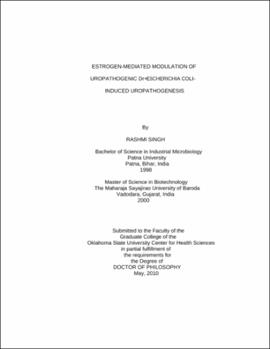| dc.contributor.advisor | Kaul, Rashmi | |
| dc.contributor.author | Singh, Rashmi | |
| dc.date.accessioned | 2013-11-26T08:22:59Z | |
| dc.date.available | 2013-11-26T08:22:59Z | |
| dc.date.issued | 2010-05 | |
| dc.identifier.uri | https://hdl.handle.net/11244/6676 | |
| dc.description.abstract | Urinary tract infection (UTI) is a disease of medical significance. One of the important clinical effects of estrogen deficiency in postmenopausal women is their increased susceptibility to UTIs. Estrogen replacement in these women is effective in prevention of bacteriuria. However, the molecular mechanisms involved with estrogen treatment against UTIs are poorly understood. Uropathogenic Dr+ E. coli can cause cystitis, recurrent UTI and pyelonephritis in humans, and induce chronic pyelonephritis in C3H/HeJ mice. Dr+ E. coli colonize and invade the host uroepithelium by adhering to decay accelerating factor (DAF) and type IV collagen and these are known to be hormonally regulated. In the present study, we investigated the role of estrogen and estrogen receptors (ER) in modulation of Dr+ E. coli uropathogenesis using an in vivo C3H/HeJ murine model and an in vitro model of mouse kidney inner medullary collecting duct (mIMCD3) cells. Ovariectomy (OVX) induced menopausal mice showed increased bacterial colonization in the bladder and kidney tissues compared to the ovary intact mice after experimental induction of Dr+ E. coli infection. Pretreatment of the OVX mice with beta-estradiol (E2) at a physiological dose reduced bacterial colonization. ER antagonist ICI 182,780 pretreatment increased bacterial colonization in the ovary intact mice, suggesting ER involvement. Furthermore, UTI induction in ERalpha-/- mice led to increased bacterial colonization in the bladder and kidney tissues compared to the ERalpha+/+ mice confirming ERalpha involvement. Increased kidney infection corresponded with an increase in DAF and type IV collagen expression in OVX as well as ERalpha-/- mice. Delayed induction of TLR2 and pro-inflammatory cytokines in the OVX and ERalpha-/- mice at onset of infection resulted in increased bacterial colonization compared to the control mice. Protective effects of estrogen against Dr+ E. coli invasion were also seen in mIMCD3 cells, where physiological levels of E2 led to a 40-50% reduction in bacterial | |
| dc.format | application/pdf | |
| dc.language | en_US | |
| dc.rights | Copyright is held by the author who has granted the Oklahoma State University Library the non-exclusive right to share this material in its institutional repository. Contact Digital Library Services at lib-dls@okstate.edu or 405-744-9161 for the permission policy on the use, reproduction or distribution of this material. | |
| dc.title | Estrogen-mediated modulation of uropathogenic Dr+ Escherichia coli-induced uropathogenesis | |
| dc.contributor.committeeMember | Blewett, Earl | |
| dc.contributor.committeeMember | Conrad, Robert S. | |
| dc.contributor.committeeMember | Rouch, Alexander J. | |
| dc.contributor.committeeMember | Kaul, Anil K. | |
| osu.filename | Singh_okstate_0664D_10941 | |
| osu.accesstype | Open Access | |
| dc.type.genre | Dissertation | |
| dc.type.material | Text | |
| dc.subject.keywords | daf and dr+ e.coli | |
| dc.subject.keywords | dr+ escherichia coli | |
| dc.subject.keywords | er alpha knock-out and uti | |
| dc.subject.keywords | estrogen | |
| dc.subject.keywords | tlr and uti | |
| dc.subject.keywords | uti | |
| thesis.degree.discipline | Biomedical Sciences | |
| thesis.degree.grantor | Oklahoma State University | |
